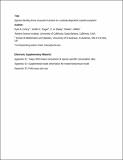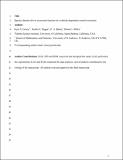Files in this item
Species identity drives ecosystem function in a subsidy-dependent coastal ecosystem
Item metadata
| dc.contributor.author | Emery, Kyle A. | |
| dc.contributor.author | Dugan, Jenifer E. | |
| dc.contributor.author | Bailey, R. A. | |
| dc.contributor.author | Miller, Robert J. | |
| dc.date.accessioned | 2022-07-28T23:47:14Z | |
| dc.date.available | 2022-07-28T23:47:14Z | |
| dc.date.issued | 2021-07-29 | |
| dc.identifier | 275294791 | |
| dc.identifier | 458ef344-5995-4c76-b3ad-90f567d67817 | |
| dc.identifier | 85111546049 | |
| dc.identifier | 000679276200002 | |
| dc.identifier.citation | Emery , K A , Dugan , J E , Bailey , R A & Miller , R J 2021 , ' Species identity drives ecosystem function in a subsidy-dependent coastal ecosystem ' , Oecologia , vol. 196 , pp. 1195-1206 . https://doi.org/10.1007/s00442-021-05002-w | en |
| dc.identifier.issn | 1432-1939 | |
| dc.identifier.other | RIS: urn:E5B74CC5438C418DDECFCE942AA22EF7 | |
| dc.identifier.other | RIS: Emery2021 | |
| dc.identifier.other | ORCID: /0000-0002-8990-2099/work/98196985 | |
| dc.identifier.uri | https://hdl.handle.net/10023/25749 | |
| dc.description | This study was supported by Grants from the US National Science Foundation including OCE 1458845 and the Santa Barbara Coastal Long-Term Ecological Research project (OCE 1232779, OCE 1831937). | en |
| dc.description.abstract | Declines in species diversity carry profound implications for ecosystem functioning. Communities of primary producers and consumers interact on evolutionary as well as ecological time scales, shaping complex relationships between biodiversity and ecosystem functioning. In subsidized ecosystems, resource inputs are independent of consumer actions, offering a simplified view of the relationship between species diversity and function for higher trophic levels. With food webs supported by substantial but variable inputs of detritus from adjacent marine ecosystems, sandy beaches are classic examples of subsidized ecosystems. We investigated effects of consumer species diversity and identity on a key ecological function, consumption of kelp wrack from nearshore giant kelp (Macrocystis pyrifera) forests. We assessed effects of species richness on kelp consumption by experimentally manipulating richness of six common species of invertebrate detritivores in laboratory mesocosms and conducting field assays of kelp consumption on beaches. Consumer richness had no effect on kelp consumption in the field and a slight negative effect in laboratory experiments. Kelp consumption was most strongly affected by the species composition of the detritivore community. Species identity and body size of intertidal detritivores drove variation in kelp consumption rates in both experiments and field assays. Our results provide further evidence that species traits, rather than richness per se, influence ecosystem function most, particularly in detrital-based food webs with high functional redundancy across species. On sandy beaches, where biodiversity is threatened by rising sea levels and expanding development, our findings suggest that loss of large-bodied consumer species could disproportionally impact ecosystem function. | |
| dc.format.extent | 12 | |
| dc.format.extent | 851428 | |
| dc.format.extent | 540422 | |
| dc.language.iso | eng | |
| dc.relation.ispartof | Oecologia | en |
| dc.subject | Biodiversity | en |
| dc.subject | Generalist consumers | en |
| dc.subject | Body size | en |
| dc.subject | Detrital subsidies | en |
| dc.subject | Sandy beach | en |
| dc.subject | GE Environmental Sciences | en |
| dc.subject | NDAS | en |
| dc.subject | SDG 14 - Life Below Water | en |
| dc.subject | AC | en |
| dc.subject.lcc | GE | en |
| dc.title | Species identity drives ecosystem function in a subsidy-dependent coastal ecosystem | en |
| dc.type | Journal article | en |
| dc.contributor.institution | University of St Andrews. Statistics | en |
| dc.contributor.institution | University of St Andrews. Centre for Interdisciplinary Research in Computational Algebra | en |
| dc.identifier.doi | 10.1007/s00442-021-05002-w | |
| dc.description.status | Peer reviewed | en |
| dc.date.embargoedUntil | 2022-07-29 |
This item appears in the following Collection(s)
Items in the St Andrews Research Repository are protected by copyright, with all rights reserved, unless otherwise indicated.


